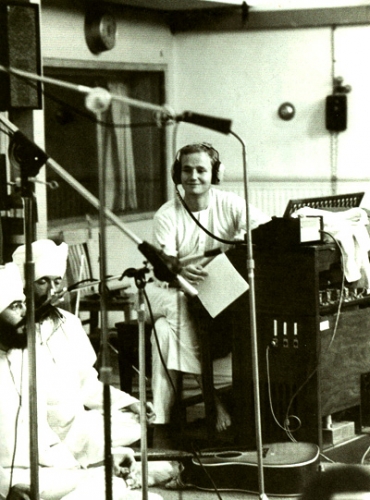
Lex Hixon affected many lives in different ways. In the course of his own studies, he became an accomplished adept in (among other traditions) Zen, Vedanta, Sufism, and Russian Orthodoxy. His house in the Riverdale section of the Bronx often functioned as a haven for people who represented religion at the crossroads. A robed Tibetan high lama would be coming in one door as a disgruntled runaway from a Zen community would be entering through another, and Lex’s magnanimity extended equally to each. Of all the roles that Lex played, none surpasses in significance the post he held at WBAI, the public radio station in New York City where, from 1971 to 1984, he conducted a weekly radio show called “In the Spirit.” He interviewed rabbis, sheiks, priests, ministers and representatives from an impressive range of religious traditions. Provided here is a partial list of the programs that featured Buddhist teachers. Using the medium of radio technology to transmit the dharma, Lex Hixon introduced virtually thousands of listeners to their spiritual guides. Even in abridged form, this list of programs suggests how ahead of the curve Lex was and how open-ended his interests were. The tapes are currently being archived for public use.
1974
• Lex Hixon invites Robert Thurman, then professor at Amherst and Harvard, to discuss his experiences with Buddhist teachings. At a later date Thurman and Hixon undertake a broad philosophical discussion about Buddhism.
• Interview with Kalu Rinpoche on Tibetan Buddhist teachings with the help of a translator. A taped refuge ceremony is included.
• During a subsequent program Lex reads Milarepa and again interviews Kalu Rinpoche, a lineage holder in Milarepa’s line.
• Lex speaks with His Holiness Sakya Trizin, the fortieth preceptor in a line of lineage holders of the Sakya order, about initiation, taking refuge, and various Buddhist teachings and deities.
• In a separate program Lex hosts a show with Sakya Trizin, with a particular emphasis on the feminine principle of the Divine.
• Lex meets again with Sakya Trizin, who shares his knowledge of the tantric practices of Tibetan Buddhism, particularly the Kalachakra initiation.
1975
• Lex interviews Tarthang Tulku Rinpoche, a lama of the Nyingma sect of Tibetan Buddhism who had already taken up residence in California, and converses with several of the Rinpoche’s students.
• Lex interviews Joseph Goldstein, an American teacher of Vipassana (who had just co-founded the Insight Meditation Society) about his interests in Western and Eastern philosophy.
• Eido Tai Shimano Roshi of the Zen Studies Society in New York is interviewed and a tape is aired of Lex discussing Zen with Eido Roshi’s teacher, Soen Roshi.
1976
• On July 4, the bicentennial of the United States, Lex interviews His Holiness Dudjom Rinpoche about Guru Padmasambhava. The translator is Sogyal Rinpoche.
1977
• Lex hosts Jamgon Kongtrul Rinpoche, a Tibetan Buddhist adept, who speaks on various teachings with the help of a translator.
• Lex’s guest is Master Sheng-yen, a Chinese Ch’an (Zen) teacher who immigrated to Taiwan and who spends part of each year in New York, teaching and giving retreats. In two following programs Lex interviews Master Sheng-yen about Ch’an practice. In a fourth program, Master Sheng-yen chants the Three Refuges.
1978
• Guest host Judy Frank speaks with Khenpo Karthar Rinpoche, a Tibetan Buddhist teacher who has been teaching in the United States since the mid-seventies and who has centers in New York, Chicago, Ann Arbor, and several other cities.
• Bernie Glassman talks to Lex Hixon shortly before he opens the Zen Center of New York.
1979
• Lex presents a three-hour special about His Holiness the Dalai Lama through readings and interviews with a Tibetan diplomat, a professor, and several high lamas. A tape of His Holiness speaking is also aired during the show.
• Guest host Eve Quinn talks with John Daido Loori, Zen practitioner and photographer from the Los Angeles Zen Center. (In 1980 he founded Zen Mountain Monastery in Mount Tremper, New York.)
1980
• Lex talks to John Daido Loori about photography as a means of spiritual expression. In a separate program, Eve Quinn talks to Loori about his new practice oriented arts community.
• In another interview with Khenpo Karthar Rinpoche, Judy Frank asks the Tibetan teacher about the Four Noble Truths and their relevance in daily life.
• Jack Kornfield, co-founder of the Insight Meditation Society, discusses his practice with Lex.
The following programs with Buddhist practitioners and teachers are not dated:
• Lex interviews Allen Ginsberg, poet and Buddhist practitioner.
• Ruth Dennison, Vipassana teacher and founder of the Desert Vipassana Center, speaks with Lex.
• Lex interviews Seung Sahn, the Korean Zen teacher who founded the Providence Zen Center and established the Kwan Um School of Zen.
• Lex presents a show dedicated to Chogyam Trungpa Rinpoche, a contemporary Tibetan master, with excerpts from his writings, a taped interview, discussions with two of his students, and a live interview.
• Louise Berle, a student of Zen master Yasutani Roshi, speaks with Lex about her spiritual experiences. Philip Kapleau, a Zen disciple and compiler of Three Pillars of Zen, is interviewed by Lex.
• Lex interviews Delancey Kapleau, a Canadian-born spiritual practitioner who speaks about Zen, Hindu practices, and astrology.
• Lex reads from Zen master Hakuin’s writings about enlightenment experiences, and the New York Zen Community presents a program with Zen instructions and various Zen teachings.
• Lex discusses the Buddhist teachings of non-self and the principle of impermanence with Lou Nordstrom, a Westerner who left Columbia University to become a Zen Buddhist monk.